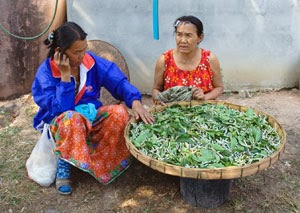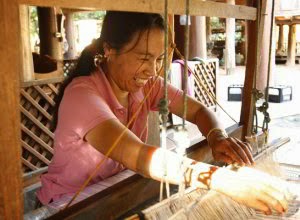Our Artisan Partners
We're proud to have worked with artisan groups in Thailand and Laos from 2007-2016. A short description of each of our partner groups follows. For more information and stories:
- Visit our Blog to read stories on the road.
- Watch our slideshows on YouTube.
- See our photo essays: Weaving Sustainable Communities and Social Fabric.
- Preview free and order our 4 books about our artisan partners and our book about silk in our Blurb bookstore. Now available as ebooks!
- Read our blog post about the Kokkabok Women's Cotton Group: Organic Cotton Improves Village Life, featured in Paola Gianturco's book, GRANDMOTHER POWER: A Global Phenomenon.
- Panmai Group - northeast Thailand (Isaan)
- Prae Pan Group - northeast Thailand (Isaan) - now closed
- Mulberries - northeast Laos
- Junhom Bantan - northern Thailand
- Warm Heart Foundation - northern Thailand
- Napafai - northeast Thailand (Isaan)
- The Houey Hong Vocational Training Centre for Women - central Laos
- Saoban - northern, central & southern Laos - now called TaiBaan
- Fai Gaem Mai at Chiang Mai University - northern Thailand - on Facebook
"You must consider the whole process if you want to support this art. It is difficult to produce by hand. Our work is real women's group work, handmade art and tradition."
Mae Samphun Jundaeng
Chairperson, Panmai Group
Northeast Thailand
 PANMAI GROUP
PANMAI GROUP
Panmai Group has
250 members living in 3 provinces in northeast Thailand in both Khmer
and Laotian villages, who draw on these cultural traditions in their
designs. These women are highly skilled in sericulture (the entire cycle
of silk production) and are proud to weave only organic, village-reeled
and naturally dyed silk yarns.They are expert and widely respected for their dyeing skills using natural materials, protecting both their own health and that of their environment.
Panmai was a member of The ThaiCraft Association which was a member of the World Fair Trade Organization, the global network of Fair Trade Organizations.
Preview our photo book about Panmai Group online for free.
 PRAE PAN
PRAE PAN
It
is with sadness that we say goodbye to Prae Pan, the weaving co-op with
whom TAMMACHAT first began our work. After more than 2 decades, the
community business decided in January 2013 to close its doors as members
age and retire. [Note: As of 2014, Prae Pan is still working on a small scale, we are happy to hear, although they no longer have a storefront.]We continue to sell their products with a focus on their soft cottons. And we thank them for their generosity and partnership over the years.
Prae Pan Group had dozens of members in northeast Thailand's Khon Kaen province. They were highly skilled at supplementary weft weaving and the natural dyeing of cotton, and they wove organic silk as well. Prae Pan operated for more than 20 years and was proud to be entirely villager-run and self-sufficient. They spawned a successful credit union that continues its work with more than 500 members.
Preview our photo book about Prae Pan Group online for free.
 MULBERRIES
MULBERRIES
Mulberries is the market brand of the Lao Sericulture Co., a not-for-profit social enterprise that is accredited by the World Fair Trade Organization.
Its goal is to strengthen the position of women in Laos by providing
them with dependable incomes and to preserve their sophisticated weaving
and natural dyeing techniques. Women are further trained to bring
diverse skills and environmental sustainability to the complex cycle of
silk production with extraordinary results. Founder Kommaly Chantavong was a nominee for 1000 Women for the Nobel Peace Prize 2005 for her work on this important project that is recognized for its
poverty alleviation, cultural preservation and peace building. In 2015, she was awarded Asia’s Premier Prize and Highest Honor, the Ramon Magsaysay Award.
Founder Kommaly Chantavong was a nominee for 1000 Women for the Nobel Peace Prize 2005 for her work on this important project that is recognized for its
poverty alleviation, cultural preservation and peace building. In 2015, she was awarded Asia’s Premier Prize and Highest Honor, the Ramon Magsaysay Award.Preview our photo book about Mulberries Organic Silk online for free.
JUNHOM BANTAN
Junhom Bantan is a northern Thai weaving group that specializes in eco-friendly natural dyes and handweaving. They weave with soft, handspun cotton, as well as stronger, unbleached cotton yarns. These cultural traditions are still alive and well, thanks to the efforts of Mai, the woman who acts as the group's manager and whose mother started the group many years ago.A keen interest in natural fibres and natural dyes in Japan, as well as other countries, continues to provide a market for their eco-textiles.
The group has received “Green Product” certification from the Thai Department of Environmental Quality Promotion, available only to small textile producers that use environmentally responsible processes.
WARM HEART FOUNDATION
 Warm Heart Foundation is
a grassroots organization that empowers rural Thai villages in the
Phrao district of northern Thailand. Their Microenterprise program helps
local artisans and entrepreneurs generate their own sources of income
by supplementing local artisan and craft skills with business know-how
and access to retail markets.
Warm Heart Foundation is
a grassroots organization that empowers rural Thai villages in the
Phrao district of northern Thailand. Their Microenterprise program helps
local artisans and entrepreneurs generate their own sources of income
by supplementing local artisan and craft skills with business know-how
and access to retail markets.Warm Heart also trains landless women in silk growing, spinning, natural dyeing and weaving. Our spun Eri silk scarves are made by the Pa Daeng Weavers, a temple-based group, in partnership with a Warm Heart weaving co-operative. In 2013, they planted fields of Eri silkworms' favourite food with plans to increase Eri silk production in future years.
 NAPAFAI
NAPAFAI
Napafai
is a social enterprise that works with a network of small,
village-based weaving groups near and along the Mekong River in Ubon
Ratchathani province in northeast Thailand. In past years, the groups
were part of the Organic Cotton Project set up by a Thai NGO that works
to balance development and conservation among disadvantaged communities
and stateless peoples along Thailand's borders. Now Napafai helps these
groups develop new products and market their work in the capital city of
Ubon and beyond.Their products are handmade with an indigenous species of cotton organically grown along the Thai-Lao border on the banks of the Mekong River or sourced from their network in Laos. One village group specializes in indigo dyeing, always popular for its lively colour – "nature’s true blue."
Preview our photo book "Weaving Sustainable Communities: Organic Cotton Along the Mekong" online for free.
HOUEY HONG VOCATIONAL TRAINING CENTRE FOR WOMEN
 Houey Hong Vocational Training Centre for Women, located
outside Vientiane, the capital of Laos, offers training and employment
for Lao women from disadvantaged backgrounds in the areas of natural
dyeing, traditional Lao weaving, tailoring and small business
administration. We carry some of their beautiful silk scarves.
Houey Hong Vocational Training Centre for Women, located
outside Vientiane, the capital of Laos, offers training and employment
for Lao women from disadvantaged backgrounds in the areas of natural
dyeing, traditional Lao weaving, tailoring and small business
administration. We carry some of their beautiful silk scarves.According to its website, Houey Hong Vocational Training Centre for Woman has 3 main objectives:
Initially funded by Japanese and other development organizations, they now rely on income from the sale of products made by trainees and staff (past trainees), and from tour activities at the Centre.
- To provide training for various skill levels, in weaving, dyeing and tailoring for women from rural areas who are disadvantaged, poor and/or who have a disability
- To revive and support Lao's traditional crafts, such as natural dyeing and traditional weaving
- To introduce other suitable skills, such as tailoring, to women who have little education
In 2009 TAMMACHAT partnered with Atlantic Spinners and Handweavers to raise money for the training of 3 young women at the Houey Hong Centre.
 SAOBAN (now called TaiBaan)
SAOBAN (now called TaiBaan)
TaiBaan (Village Handicrafts From the Heart of Laos) is a fair trade social
enterprise that has grown out of earlier sustainability projects in the
Lao countryside. Many of these were the work of a local NGO, the
Participatory Development Training Centre (PADTEC).Saoban, meaning "village people," now stands on its own feet, which ideally is the goal of all development projects. It works closely with village artisan groups in many regions of this diverse and mountainous country to provide training in business planning, product development, marketing, and access to micro-credit.
Saoban provides much-needed markets for village products that range from handspun, organic cotton scarves and iPad sleeves to bamboo-silk handbags and naturally dyed silk scarves. This is part of PADETC's vision for Laos: education for sustainable development.
FAI GAEM MAI

Fai Gaem Mai
(The Cotton and Silk Project) is based at the Institute for Science and
Technology Research at Chiang Mai University. It helps community-based
production groups in northern Thailand develop handwoven Eri silk
products, one of the textile products that TAMMACHAT carries. The Eri
silkworm feeds on the leaves of cassava, rather than mulberry, providing
additional income for villagers already growing this high-volume,
low-value commodity.Fai Gaem Mai was a member of The ThaiCraft Association, which was a member of the World Fair Trade Organization.

